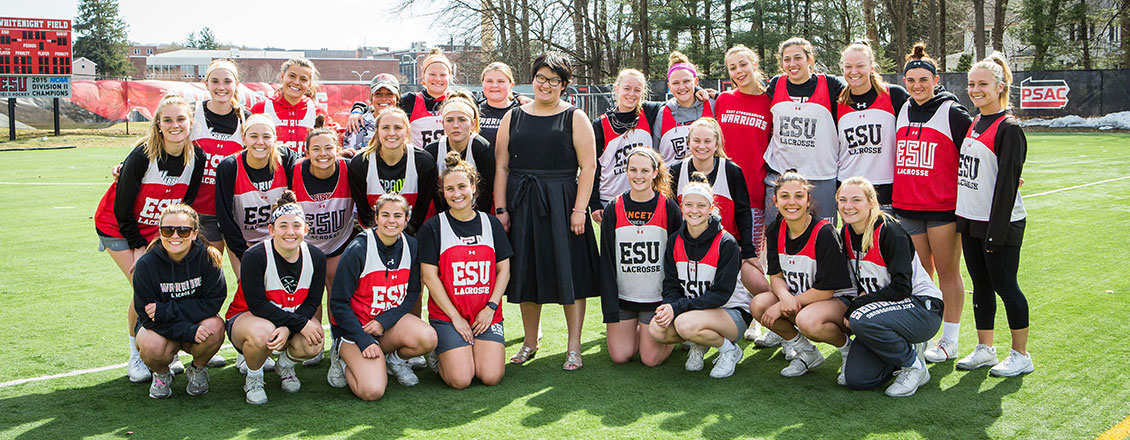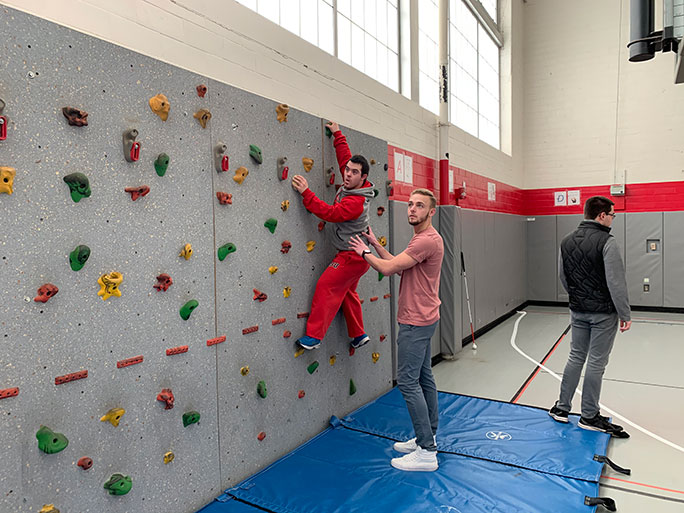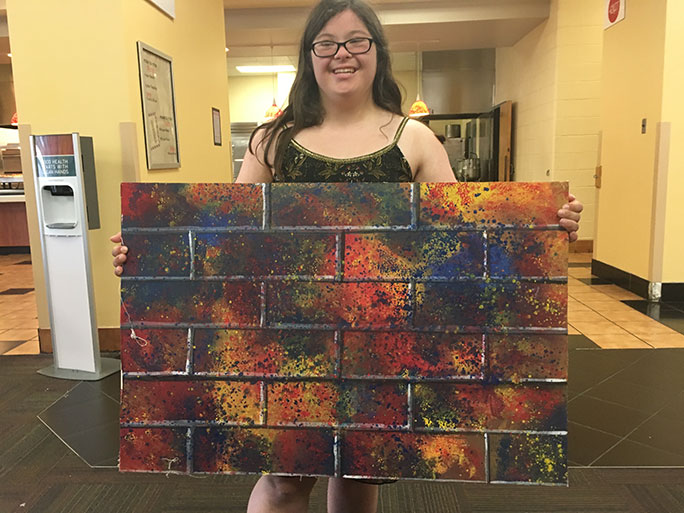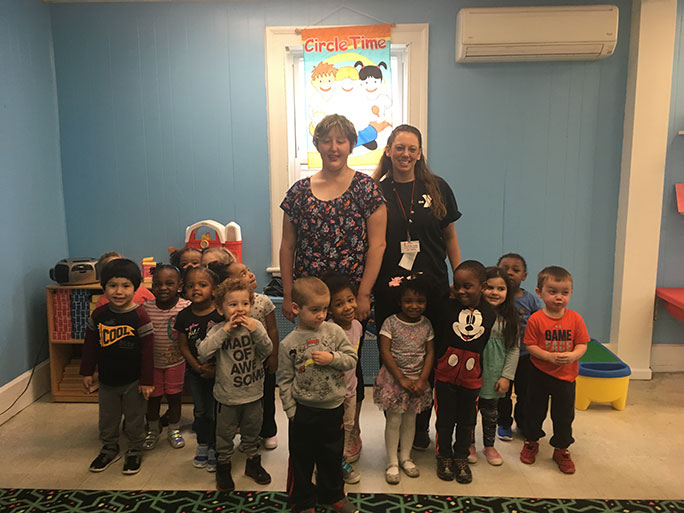
Peer Mentors
Career and Independent Living and Learning Studies (CILLS) at East Stroudsburg University provides students with intellectual disabilities, a plan of study which utilizes a system of mentors. Mentors are central to the program and reflect the primary mode for inclusion within the ESU college community.
A mentor is a similar age companion that assists and guides a CILLS student for the purpose of unlocking and achieving his or her potential. A mentor must build trust with the CILLS student and model positive behaviors. An effective mentor understands that his or her role is to be dependable, engaged, authentic and tuned into the needs of the CILLS student. A key role for the mentor is to provide support for the successful inclusion in traditional college classes, campus and community activities. The mentor’s relationship is beyond assistance and should reflect shared experiences that result in mutual benefit. The mentor will make a real impact through consistent an ongoing relationship building.
Mentoring Pyramid
 Build Trust: Trust is the foundation of all healthy relationships. To build trust
a mentor should be attentive to the needs of the student. Make sure they know you
are available to them.
Build Trust: Trust is the foundation of all healthy relationships. To build trust
a mentor should be attentive to the needs of the student. Make sure they know you
are available to them.- Listen: The art of listening is really the art of waiting to talk. It’s making sure you understand the thoughts of others. Your willingness to listen is often more valuable than your ability to give advice.
- Encourage: You can support the students through their journey by encouraging them to keep going even when it gets tough. Focus on the positive. Remind them of what they have done right and what they have the potential to do in the future. EMPOWER rather than enable. Focus on doing things with the students rather than for them.
- Be Reliable: You have the opportunity to show the students what commitment looks like. Model the behavior you would like them to adopt.
- Have Fun: Mentors are NOT parents but friends to help guide the students. Take time to do activities that you all enjoy. Try new things. Have a sense of humor.
Mentor Responsibilities
Peer Mentor
 The Peer Mentor is vital to the program and reflect the primary mode for inclusion
within the ESU college community. Students enrolled in the College of Education teacher
preparation degree program (i.e. Special Education, Early Childhood and Elementary
Education, Secondary Education and Rehabilitation Services and Psychology majors)
will be recruited and trained. Participants will be matched according to common interests
and desire to obtain a learning experience based on reciprocity. This will allow the
participant preparing to become a teacher or rehabilitation professional to obtain
firsthand knowledge and experience through formal tutoring type of interaction and
informal participant interactions typical of college life. The Peer mentor will build
trust and companionship with the CILLS students.
The Peer Mentor is vital to the program and reflect the primary mode for inclusion
within the ESU college community. Students enrolled in the College of Education teacher
preparation degree program (i.e. Special Education, Early Childhood and Elementary
Education, Secondary Education and Rehabilitation Services and Psychology majors)
will be recruited and trained. Participants will be matched according to common interests
and desire to obtain a learning experience based on reciprocity. This will allow the
participant preparing to become a teacher or rehabilitation professional to obtain
firsthand knowledge and experience through formal tutoring type of interaction and
informal participant interactions typical of college life. The Peer mentor will build
trust and companionship with the CILLS students.
Responsibilities: To arrive on time and to be prepared to engage with the CILLS participant in either an academic or social activity that has been agrees upon. Support students in social situations, tutoring during academic activities, support them during dinner to make choices about proper food and nutrition, support them during fitness activities and assist them in accessing clubs and organizations. The main objective of the CILLS mentor is to help students become orientated into college life and to role model/teach them how to conduct themselves in various situation and activities.
Academic Mentor
The Academic Mentor is an essential part of the student success in participating in university audited classes. The Academic Mentor is the link between the educational information presented in class and the students understanding and comprehension of the material. They identify the students’ strength and abilities while modifying the content to suit their learning styles. They serve as a liaison between the Professor and the CILLS Academic Coordinator.
Responsibilities: To arrive on time and to be prepared to engage with the CILLS participant in an academic manner. The Academic Mentor will be responsible for attending and assisting CILLS students in audit classes and following up with homework assignments, tests and projects. The Academic Mentor will be a liaison between the professor of the audit class and the Academic Coordinator of the CILLS Program. The Academic mentor will report on the progress of the student and communicate when coursework is due and when modifications are needed. The Academic mentor may also give support in the evening at the student’s home. The academic mentor will help the student with homework, studying for tests and projects.
Job Coach
 The Job Coach is an integral part of the philosophy and success of the CILLS practicum
and internship experience. Job coaches are a link between the student intern and the
work environment. The Job Coach lays the foundation for student success by identifying
students’ strengths and abilities, teaching self-advocacy, creating task analysis,
developing job accommodations and teaching appropriate work-related and interpersonal
behaviors.
The Job Coach is an integral part of the philosophy and success of the CILLS practicum
and internship experience. Job coaches are a link between the student intern and the
work environment. The Job Coach lays the foundation for student success by identifying
students’ strengths and abilities, teaching self-advocacy, creating task analysis,
developing job accommodations and teaching appropriate work-related and interpersonal
behaviors.
Responsibilities: To Support students in understanding and completing tasks. Design support tools and outlines for specific tasks (as needed). The Job Coach will model respectful and appropriate work behavior. They will encourage student to interact with supervisor/coworker (greetings/social conversations, additional task requests etc.). Complete task analysis (as defined by vocational coordinator). Complete monthly and final student evaluations. Communicate with the Community Transition Coordinator regarding student progress, employee feedback, support/modification needs.
Contact Us
Contact Information
- Campus Address
- Stroud Hall
- Phone:
- (570) 422-3558
- Title of Department Leader
- Program Director
- Name
- Dr. Domenico Cavaiuolo
- E:
- dcavaiuolo@esu.edu
- Phone:
- (570) 422-3893



